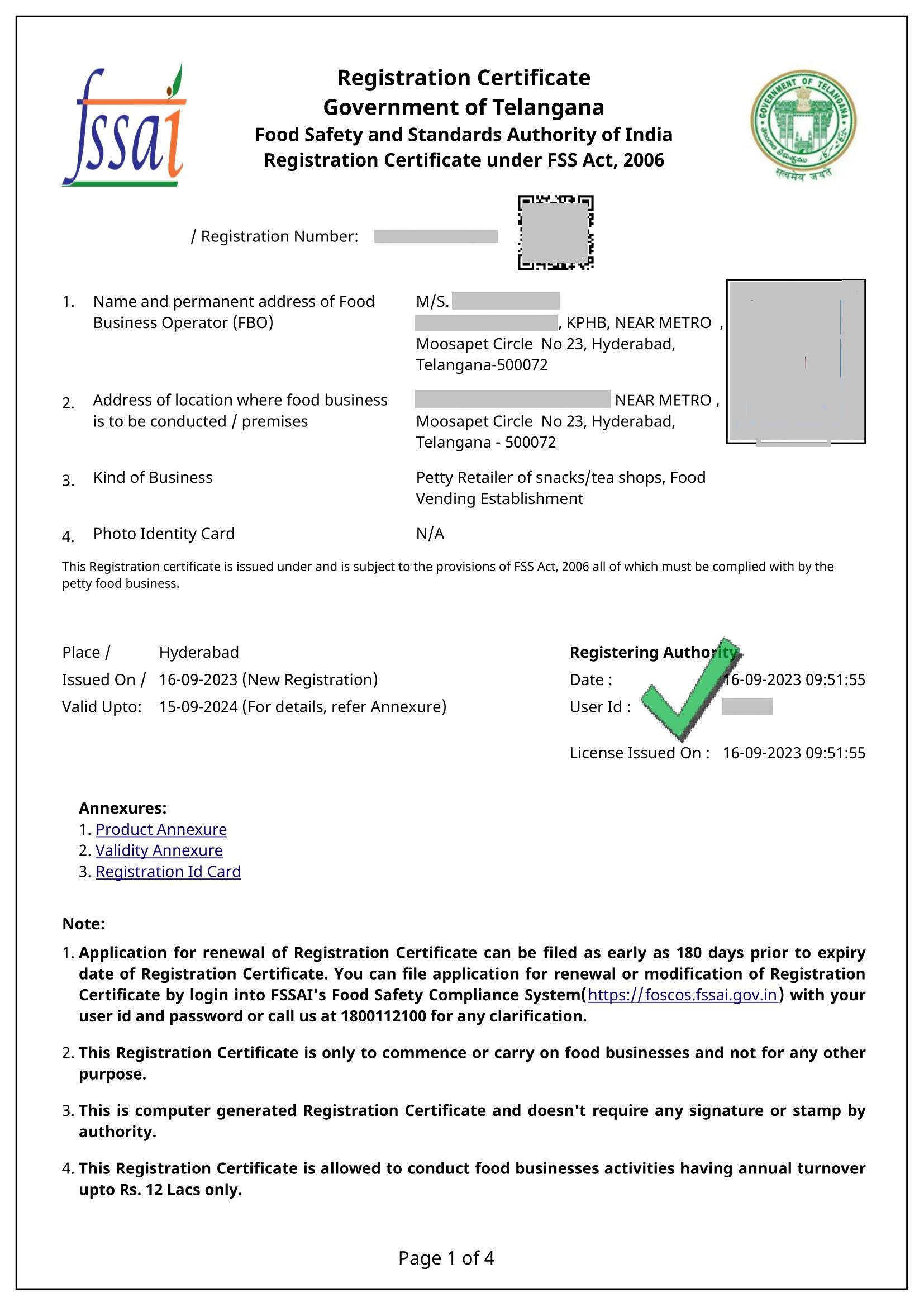Food License Registration Services in Telangana – Fast, Hassle-Free & Affordable
If you’re starting or running a food-related business in Telangana, getting an FSSAI Food License isn’t just a legal requirement—it’s a mark of trust for your customers. At Invention Tax Solutions, we offer Food License Registration Services in Telangana that are quick, reliable, and 100% compliant with FSSAI (Food Safety and Standards Authority of India) guidelines.
Whether you run a cloud kitchen in Hyderabad, a small bakery in Warangal, or a food export business in Karimnagar, our experts make the registration process seamless—so you can focus on growing your business, while we handle the legalities.
Why Food License Registration is Essential in Telangana
Operating without a valid food license can lead to hefty penalties, business closure, and loss of trust. The FSSAI Food License ensures:
-
Legal Compliance – Meet all state and central government food safety regulations.
-
Customer Trust – Display your license number to assure customers about your food quality.
-
Business Expansion – Essential for online platforms like Swiggy, Zomato, and e-commerce listings.
-
Brand Recognition – Adds credibility to your brand, making it easier to win partnerships.
-
Avoiding Penalties – Protects you from fines up to ₹5 lakh for non-compliance.
Who Needs a Food License in Telangana?
You must get a food license if you:
-
Own a restaurant, café, bakery, or catering service.
-
Operate a cloud kitchen or home-based food business.
-
Manufacture or package food products.
-
Export or import food items.
-
Sell food products online or through delivery apps.
-
Run a grocery store, dairy, meat shop, or food stall.
Example:
If you’re running a tiffin service in Hyderabad and want to list your menu on Swiggy, the platform will ask for your FSSAI license number before activating your account.
Types of FSSAI Food Licenses in Telangana
Basic Registration
State License
Central License
Documents Required for Food License Registration in Telangana
-
Identity proof (Aadhaar/Passport/Voter ID)
-
Address proof of business premises
-
Passport-size photographs of the applicant
-
Business registration certificate (if applicable)
-
Food safety management plan
-
List of food products to be handled/manufactured
-
Proof of turnover (for State/Central license)
How Invention Tax Solutions Helps You Get Your Food License
Our Food License Registration Services in Telangana cover everything from consultation to final approval.
Step-by-Step Process
-
Free Consultation – We assess your business type and turnover to recommend the right license.
-
Document Preparation – We compile and verify your paperwork for error-free submission.
-
Online Application Filing – Submission to FSSAI portal on your behalf.
-
Follow-ups & Clarifications – Handling queries from FSSAI authorities.
-
License Delivery – Receive your license digitally within the promised timeline.
(We also provide GST Registration in Telangana, Trade License Registration, and MSME Registration for complete compliance.)
Benefits of Choosing Invention Tax Solutions
-
✅ Fast Processing – Get your license in the shortest possible time.
-
✅ Affordable Pricing – No hidden charges; transparent fee structure.
-
✅ Expert Guidance – 10+ years of industry experience.
-
✅ Pan-Telangana Coverage – Services available in Hyderabad, Warangal, Karimnagar, Nizamabad, and more.
-
✅ Ongoing Support – We help with license renewal and updates.
Real-Life Client Success Story
Case: A home chef in Hyderabad wanted to expand her tiffin business through Zomato.
Challenge: She had zero knowledge of FSSAI procedures.
Solution: Our team handled the registration from start to finish, enabling her to get listed on Zomato within 10 days.
Result: She now serves over 200 customers per week and recently started bulk catering orders.
Why Telangana Businesses Trust Us
Invention Tax Solutions has helped 500+ food businesses in Telangana obtain their licenses—ranging from street vendors to multinational chains. We understand the state-specific guidelines and have strong connections with regulatory authorities, ensuring faster approvals.
Additional Services We Offer in Telangana
-
GST Registration – For businesses needing tax compliance.
-
Trade License Registration – To legally operate your business in municipal areas.
-
Labour License Registration – For establishments employing workers.
-
MSME Registration – For government benefits and subsidies.
-
Trademark Registration – To protect your brand identity.
FAQs – Food License Registration Services in Telangana
1. How long does it take to get a food license in Telangana?
Usually 7–15 working days, depending on the license type and documentation accuracy.
2. What is the cost of food license registration in Telangana?
It varies based on the type of license—Basic, State, or Central. We provide an exact quote after assessment.
3. Is it mandatory for home-based food businesses to get an FSSAI license?
Yes, even home bakers and tiffin services must register with FSSAI.
4. Can I apply for the license myself?
Yes, but using a professional service like ours ensures error-free and faster approval.
5. What happens if I operate without a food license?
You risk penalties up to ₹5 lakh and possible business closure.
6. Can I use one license for multiple locations?
No, each location requires a separate license unless it’s a central license for a chain.
7. How do I renew my food license?
Renew at least 30 days before expiry. We offer hassle-free renewal services.
8. Is a food license required for food exporters in Telangana?
Yes, exporters need a Central FSSAI License.
9. Can I upgrade my license later?
Yes, we can help you upgrade from Basic to State or Central license as your business grows.
10. Do I need a license if I only sell packaged food online?
Yes, all food business operators, including e-commerce sellers, need FSSAI registration.
Get Your Food License Today!
Don’t risk your business reputation or face penalties. Let Invention Tax Solutions handle your Food License Registration in Telangana with complete professionalism and speed.
📞 Call Us Now: +91-7993132530
📩 Email: contact@inventiontaxsolutions.com
💻 Book Your Service Online








